

Best Books of 2018: Suicide of the West & Enlightenment Now. Best Books of 2018: Life after Google. Review of “Life after Google: The Fall of Big Data and the Rise of the Blockchain Economy” by George Gilder (Gateway Editions, 2018).
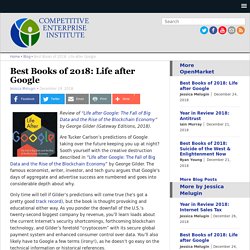
Are Tucker Carlson’s predictions of Google taking over the future keeping you up at night? Sooth yourself with the creative destruction described in “Life after Google: The Fall of Big Data and the Rise of the Blockchain Economy” by George Gilder. The famous economist, writer, investor, and tech guru argues that Google’s days of aggregate and advertise success are numbered and goes into considerable depth about why. Only time will tell if Gilder’s predictions will come true (he’s got a pretty good track record), but the book is thought provoking and educational either way. Gilder will help you take your small talk game to the next level at those New Year’s Eve parties by explaining Bell’s Law (it states that every decade a hundredfold drop in the price of processing power creates a new computer architecture—duh).
How deep is the decline of the West? In the last chapter of his autobiography The World of Yesterday: Memories of a European (1942), Stefan Zweig lamented a lost world of freedom: “Before 1914, the earth had belonged to all.
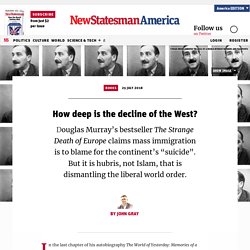
People went where they wished and stayed as long as they pleased. There were no permits, no visas, and it always gives me pleasure to astonish the young by telling them that before 1914 I travelled to India and to America without passport and without ever having seen one. One embarked and alighted without questioning or being questioned… The frontiers which, with their customs officers, police and militia, have become wire barriers thanks to the pathological suspicion of everybody against everybody else, were nothing but symbolic lines which one crossed with as little thought as one crosses the Meridian of Greenwich… I, a case-hardened creature of an age of freedom and a citizen of the world-republic of my dreams, count every impression of a rubber stamp in my passport a stigma…”
FACTFULNESS: A Book Review. Book review by Kip Hansen Hans Rosling’s FACTFULNESS : Ten Reasons We’re Wrong About the World–and Why Things Are Better Than You Think is currently Amazon’s #1 Best Seller in the category Probability & Statistics.
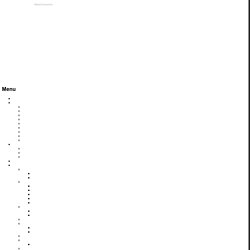
Walmart’s bookstore lists it in the Adult Non-Fiction Top 100. It gets fabulous reviews: “Inspiring and revelatory, filled with lively anecdotes and moving stories, Factfulness is an urgent and essential book that will change the way you see the world and empower you to respond to the crises and opportunities of the future.” “In Factfulness, Professor of International Health and global TED phenomenon Hans Rosling, together with his two long-time collaborators, Anna and Ola, offers a radical new explanation of why this happens.
Hans Rosling, who before his death in February 2017, was a darling of the TED Talk circuit, said: “This book is my last battle in my life-long mission to fight devastating ignorance.” The One-Sided Worldview of Hans Rosling. A review of Factfulness: Ten Reasons We’re Wrong About the World – and Why Things Are Better Than You Think by Hans Rosling, with Ola Rosling and Anna Rosling Rönnlund.
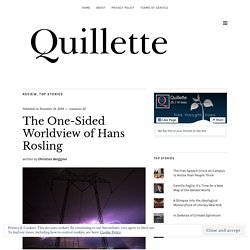
Flatiron Books (April 2018) 352 pages. Charisma and upbeat messages about global trends made the late Hans Rosling (1948–2017), professor at Karolinska Institute in Sweden, an international TEDTalk-star, listed among TIME Magazine´s “The World´s 100 Most Influential People” already in 2012. The posthumous book, Factfulness written with his son and daughter-in-law is now becoming a global bestseller. Bill Gates promises to hand it out to all US university graduates. Nature is full of praise: “This magnificent book ends with a plea for a factual world view. A review of Factfulness needs to start with acknowledging that it makes several positive contributions, for example a new perspective on global poverty and well-being. 1. 2. For Factfulness these are non-questions. 3. Final China Study Response (HTML Version) (For those who are brave, can’t view PDFs, or simply adore scrolling.
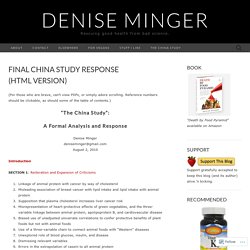
Reference numbers should be clickable, as should some of the table of contents.) “The China Study”: A Formal Analysis and Response Denise Minger deniseminger@gmail.com August 2, 2010 Introduction. Proteinaholic: Is it Time to Sober Up From Animal Foods? (A Review and Critique) NOTE: This was originally supposed to be a guest post for Kris Gunnars’ Authority Nutrition website, but in true Denise Minger fashion, the word count got out of control and we decided to dock it here instead.
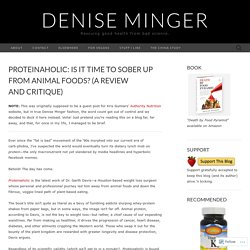
Voila! Just pretend you’re reading this on a blog far, far away, and that, for once in my life, I managed to be brief. Ever since the “fat is bad” movement of the ‘90s morphed into our current era of carb-phobia, I’ve suspected the world would eventually turn its dietary lynch mob on protein—the only macronutrient not yet slandered by media headlines and hyperbolic Facebook memes.
Behold! The day has come. Proteinaholic is the latest work of Dr. The book’s title isn’t quite as literal as a bevy of fumbling addicts slurping whey-protein shakes from paper bags, but in some ways, the image isn’t far off. Regardless of its scientific validity (which we’ll get to in a minute!) But that leads us to the question: does this book make a legitimate case against animal protein? The Good 1. 2. Critical Review of Michael Greger’s “How Not to Die” The 18 Best Books of 2018. Great Books Reading List and Curriculum.